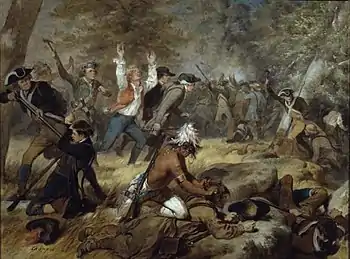Brant's Volunteers
Brant's Volunteers also known as Joseph Brant's Volunteers were irregular British Loyalist volunteers, raised during the American Revolutionary War by pro-British Mohawk chief, Joseph Brant (Mohawk: Thayendanegea), who fought on the British side in the Province of New York. Being military associators, they were not provided soldiers' uniforms, weapons, or pay by the British government, and survived by foraging, robbery, and looting of the battlefields.
| Brant's Volunteers | |
|---|---|
 Joseph Brant and his Loyalist volunteers attacked Patriot settlers on the New York frontier in what would be known as the Wyoming Massacre | |
| Active | 1777-1779 |
| Country | Kingdom of Great Britain |
| Allegiance | Kingdom of Great Britain |
| Branch | Loyalist associators |
| Type | independent rangers (auxiliary troops) |
| Role | special operations, guerrilla warfare, light infantry |
| Size | company (approximately 100-300) |
| Equipment | Mixed arms - (Brown Bess muskets, hunting rifles, tomahawks, scalping knives, etc.) |
| Engagements | American Revolutionary War
|
| Commanders | |
| Notable commanders |
|
Company formed
.jpg.webp)
The initial size of Brant's guerrilla company was approximately 100 men, comprising 20% Mohawk allies of the British, and 80% white, New York Loyalists. The Loyalists were mostly of English, Scottish, and Irish descent recruited from the Province of New York.
Although Brant himself received a captain's commission in the Six Nations Indian Department, other members of the group were Loyalist associators (volunteers). They were unpaid by the British, and relied upon plunder—and sometimes Joseph's credit—for their compensation. Eventually, Frederick Haldimand authorized provisioning, but no monetary payments. Since the unit had no official recognition, many members later transferred to Butler's Rangers and the King's Royal Regiment of New York. Later in the war, Brant was able to attract a larger number of Indians to his unit, which grew to over 300 members.
Brant's Volunteers were at the 1777 Battle of Oriskany. They fought in 1778 at the Battle of Cobleskill, the Attack on German Flatts, and the Raid on Springfield. In 1779, they were engaged at the Battle of Minisink.
Uniforms
Joseph Brant's Volunteers usually wore civilian attire. In order to avoid confusion during battle, he had his men wear yellow lace on their hats so they could be easily identified as British Loyalists.[1] Brant's men, on at least one occasion, dressed as Indians to disguise themselves while raiding their former Patriot neighbors.[2]
Company disbanded and resettled in British Canada
A few of the white Loyalist members of the Brant company were still with the unit at the end of the war, and settled with Joseph Brant and his Mohawks along the Grand River in the Province of Quebec, British Canada.
Legacy
There are three re-enactment groups of Brant's Volunteers:
1) Brant's Volunteers (Oquaga), based in Brant's home in the Mohawk Valley of New York;[3]
2) The Northwest Territorial Alliance (NWTA) group based in Indiana; and
3) a group based out of Fort Niagara in western NY.
References
- Smith, Jack Harpster and Ken Stalter (2010). Captive!: The Story of David Ogden and the Iroquois. Santa Barbara, California: ABC-CLIO. p. 72.
- Text: "Colonel Alden's Report To General, Stark; Head Quarters, Cherey Valley Aug'st 12th 1778.
- Oquaga Volunteers Archived 2011-02-02 at the Wayback Machine; webpage; accessed January 2017